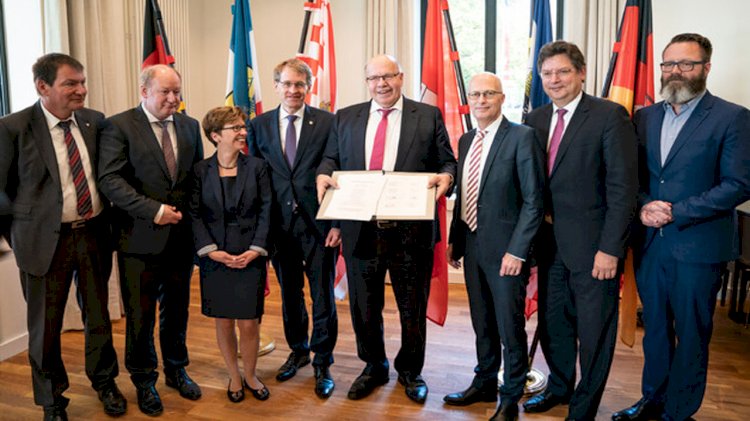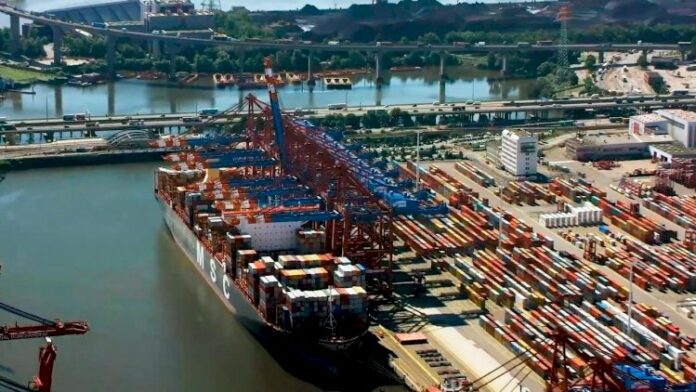Federal economics minister Altmaier and coastal states agree package of measures for shore-generated power.
Instead of burning fossil fuels to generate shipboard electric power, in future vessels in port should be using renewable shore-based energy. The German government is now launching appropriate measures to promote shore-generated power. Along with the premiers of Schleswig-Holstein and Hamburg and representatives of the state governments of Mecklenburg-Western Pomerania, Lower Saxony and Bremen, that was confirmed today by German economics minister Peter Altmaier. Meeting in Kiel, they signed an agreement listing the conditions for use of shore-generated power to provide cleaner air in German port cities.
Minister Altmaier:
“We aim to make German port cities cleaner. With these measures, we are making a significant contribution towards cleaner air and a reduction of CO2 and noise in port cities along the North Sea and Baltic coasts. We are also giving ports and shipowners planning certainty for expanding facilities and refitting ships. As an exporting country, Germany depends on sea transport. More and more people are also discovering the sea aboard cruise ships. So we attach great importance to the commercial viability and competitiveness of our ports and shipping.”
Premier Daniel Günther of Schleswig-Holstein:
“Shore-based power supply as an alternative to operating shipboard diesels represents a tangible contribution towards cleaner air and protecting the climate. That applies to the port in Kiel and all other port cities on the North Sea and Baltic. The memorandum is an initial, important step towards improving the commercial viability of shore-based power. The paper includes the reduction of the EU levy to 20 percent favoured by Schleswig-Holstein. By mid-2020 we should have initiated the essential legal steps. I am expecting rapid implementation of what we have agreed.”
The First Mayor of the Free and Hanseatic City of Hamburg, Dr. Peter Tschentscher, said:
“The memorandum is an important step in speeding up the practical use of shore-generated power in German ports. Sea trade routes are now the most economical and environment-friendly mode of transport for worldwide freight traffic. Extensive use of shore-generated power during lay times in port will make maritime logistics in general more climate-friendly.”
Use of shore-based power derived from renewable energy sources can substantially reduce emissions from ships during lay times in German seaports. However, since the costs are too high compared to those for power supply from the conventional sources, i.e., ship’s auxiliary diesels, there is currently barely any demand for it from shipowners.
Among other things, the package of measures provides for rulings that make a start on reducing levies, as well as special network charges, for cruise liners, ferries and containerships. Compared to inland shipping, seagoing ships have to reckon with distinctly higher costs, since they consume considerably more electricity during longer port lay times. They can currently only secure a supply on the basis of extremely unfavourable consumer profiles. At the same time, a programme of subsidies totalling 140 million euros should be in place from 2020 to assist states and ports in expanding essential port infrastructure.
The proposed measures have been drafted by the ‘Shore Power’ working party set up by Federal Economics Minister Altmaier along with SH premier Daniel Günther during the former’s visit to Kiel in August 2018. This includes representatives of central and regional state governments and aims to present draft regulations to the Upper and Lower Houses of the German parliament – Bundesrat and Bundestag – at an early date.
Hamburg, Kiel and Rostock seaports are already planning far-reaching expansion. A shore power supply unit for ferry services entered service in Kiel in May. The measures announced should enable such units to be operated on a commercial basis.




